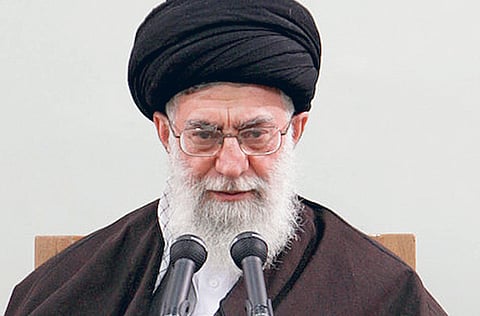Khamenei's support base eroding
Post-poll protests wear away supreme leader's once inscrutable hold on power

Tehran: As Iran celebrates the start of the Persian New Year — or Now Rouz — a time of joyful spring renewal, the country's supreme religious leader Ayatollah Ali Khamenei will use the occasion to take stock of the damage done to the regime by post-election Iran protests and a determined opposition movement.
The Green Movement has been forced off the streets by police and security forces, and senior hardline officials have declared "victory." But does Iran's most powerful man — whose official title is God's Deputy on Earth, infallible to his ardent followers — think he is winning?
Ayatollah Khamenei keeps a very tight circle, so divining the machinations of his mind can be akin to Soviet-era Kremlinology. But after watching him for decades, several close observers believe that he knows he has lost much legitimacy.
"He's in triumphant mood right now," says an Iranian political scientist, who asked not to be further identified. "But deep down, he knows he's lost the war of legitimacy and popularity."
Ayatollah Khamenei "feels he's got the upper hand at the moment," says the Iranian academic. "But at the same time, deep inside — this is my belief — he does not have a very good sleep at night. He's very angry — that's what I can see in his face. The slogans they levelled against him, the image he's got — he's lost a lot of the popularity he had."
The result is likely to be hard pushback against any further unrest, but Khamenei must strike a balance over ordering too much force. And while the opposition is temporarily sidelined, its leaders are vowing to press on.
Khamenei's calculus: Keep 30 per cent of people on board In the June 2009 election, Khamenei had declared President Mahmoud Ahmadinejad's official 2-to-1 margin of victory over former Prime Minister Mir Hussain Mousavi a "divine assessment."
But a host of irregularities caused the opposition to cry fraud, and hundreds of thousands of Iranians protested.
Scores died as hardline regime enforcers shot, clubbed, whipped, and arrested people to reestablish control during one of the most severe crises in Iran since the 1979 Islamic Revolution. Accounts of death, rape, and torture in custody further degraded Iran's reputation.
For the first time, the supreme leader became a target on the streets: Protesters burned and trampled posters of him, shouting "Death to the Dictator" and "Death to the Leader."
The reaction was an even more forceful response.
"The regime has got a lot more aggressive, and it's going to be more aggressive in coming months," says Mahdi Khalaji, a seminary-trained Iran specialist at the Washington Institute for Near East Policy (WINEP) who is working on a biography of the supreme leader.
Difficult balance
"[Khamenei] thinks, ‘If I can have even 20-30 per cent of the people with me, and have systematic pressure on the other 70 per cent, I can lead for a long time and there wouldn't be a serious threat against me'," says Khalaji, whose father, an ayatollah in the Iranian religious centre of Qom, was arrested without charge and held in solitary confinement in Evin Prison for three weeks in January.
"[Khamenei] tries to keep as many people [as he can] inside the circle of the elite, [while] empowering the suppression machinery of the regime more than before," adds Khalaji.
Analysts say keeping sufficient core supporters on board while using force against perceived "enemies" is a balance that will be difficult to maintain. A number of official rallies were hijacked by opposition activists, which embarrassed the regime, but by the 31st anniversary of the revolution on February 11, security forces and intelligence operatives had the measure of many opposition tactics.
The regime's countertactics worked, say opposition activists, who were surprised by the setback. Many had raised their expectations to fever pitch, expecting that the regime would crumble on that day. Their subsequent disappointment at being unable to even prove their numeric strength led to depression — and delight in official circles.
"It's almost like one voice coming out of the establishment, state-run television, all their hard-line newspapers, saying that ‘we managed to crush them,'" says a veteran political analyst in Tehran who could not be named. "At the same time, worries are clear to see," the analyst says. "They are not in a state of panic [as] in the past, but are still on very high alert. They feel that enemies are organising, and reformers are just pawns."
Mousavi has kept fighting back, and this week declared that the coming year would be one of "patience and endurance."
"My feeling for the future is that this movement is irreversible," Mousavi said in a speech on Monday, according to a translation of a Persian website in the Los Angeles Times. "We will never go back to the position we were in one year ago. I'm very hopeful of the future. We have to transfer patience and hope to people."
Have your say
At the start of the Iranian New Year what changes do you think are needed for Iran? What do you think lies ahead for the country? Tell us.
Sign up for the Daily Briefing
Get the latest news and updates straight to your inbox



